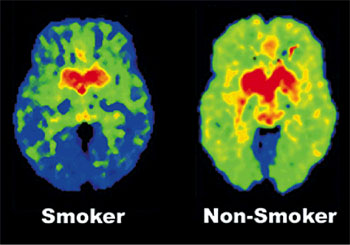 October 24, 2007 - The nicotine in tobacco products poses a significant danger of structural and chemical changes in developing brains that can make teens more vulnerable to alcohol and other drug addiction and to mental illness, according to Tobacco: The Smoking Gun, a new white paper released today by The National Center on Addiction and Substance Abuse (CASA) at Columbia University (Joseph A. Califano, Jr., chairman and president of CASA) and commissioned by The Citizens’ Commission to Protect the Truth, a group of all former U.S. Secretaries of Health, Education, and Welfare and of Health and Human Services, all former U.S. Surgeons General, and all former Directors of the Centers for Disease Control and Prevention.
October 24, 2007 - The nicotine in tobacco products poses a significant danger of structural and chemical changes in developing brains that can make teens more vulnerable to alcohol and other drug addiction and to mental illness, according to Tobacco: The Smoking Gun, a new white paper released today by The National Center on Addiction and Substance Abuse (CASA) at Columbia University (Joseph A. Califano, Jr., chairman and president of CASA) and commissioned by The Citizens’ Commission to Protect the Truth, a group of all former U.S. Secretaries of Health, Education, and Welfare and of Health and Human Services, all former U.S. Surgeons General, and all former Directors of the Centers for Disease Control and Prevention.The Commission asked CASA to assemble the scientific evidence of the impact of nicotine on the adolescent brain, conduct original analyses of data from the National Survey on Drug Use and Health (NSDUH) on the relationship between teen smoking, alcohol and illegal drug abuse and addiction and mental health, and issue a report on its findings.CASA’s original analysis of data from the NSDUH finds that teens who smoke are nine times likelier to meet the medical criteria for past year alcohol abuse or dependence and 13 times likelier to meet the medical criteria for abuse and dependence on an illegal drug than teens who don’t smoke.The CASA analysis also found that among teens ages 12 to 17, twice as many smokers as nonsmokers suffered from symptoms of depression in the past year. Teens who reported early initiation of smoking were more likely to experience serious feelings of hopelessness, depression and worthlessness in the past year.The report also notes that smoking at a young age is related to panic attacks, general anxiety disorders and post-traumatic stress disorder.
Reference: Tobacco: The Smoking Gun, Lauren Duran, 212-841-5260, Tobacco: The Smoking Gun, lduran@casacolumbia.org Sulaiman Beg, 212-841-5213,sbeg@casacolumbia.org , The National Center on Addiction and Substance Abuse at Columbia University.10/23/2007.
This comment has been removed by a blog administrator.
ReplyDelete